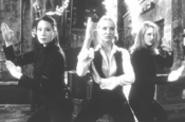But the charge of its first few minutes, which manages to contain cameos by both L.L. Cool J and Tom Green, dissipates the moment the film takes on the chore of actually telling a story. As a movie, Charlie's Angels might have made an excellent television show; it's the first film to come with its own built-in commercial breaks. But it's merely a concept in search of a plot; the filmmakers and Barrymore, whose involvement got the picture made, couldn't decide what to do beyond the notion of updating Leonard Goldberg and Aaron Spelling's show, which now airs on TV Land more often than commercials. (Then again, Spelling and Goldberg didn't have much of a clue what to do with it; does anyone remember the storyline of a single episode?) Besides, a campy, novel redo of the series already exists on television: V.I.P., starring Pamela Anderson, a far more knowing comedian than Drew Barrymore will ever be. At least Anderson never feels the need to wink at the audience; Barrymore winks, crosses her eyes, sticks out her tongue, flashes cleavage, and makes faces till she's sure we think she's funny. She wants us to like her -- there's a sad desperation to her performance here -- and Anderson couldn't care less.
Buried somewhere in this scrap heap is a story about a kidnapped computer programmer named Knox (Sam Rockwell); his partner Vivian (Kelly Lynch), who makes leather look cheap; Corwin (Tim Curry, whose appearance all but guarantees a bad movie), the computer exec who may have stolen Knox's technology; and the so-called Creepy Thin Man (Crispin Glover), who never utters a word and shows up every so often to engage the Angels in bloodless battles straight out of every Hong Kong movie made since someone decided to string up actors from high wires. As if to admit the story makes little sense -- it must be missing at least 30 minutes' worth of footage -- the film stops repeatedly to tell you what's happening; more than once are we told that Knox is really the bad guy, out to steal Corwin's technology by making him look like the villain. In one scene, rookie director McG, who really should go back to making music videos, actually rewinds the action and replays it in slow motion, as if to reassure you that Barrymore's not actually dead. The director so underestimates his audience, he all but stands in the aisles and tells us what morons we are.
Credited to three men, but written and rewritten by an army (including two of the guys responsible for High Fidelity), Charlie's Angels didn't need a director; it needed a janitor to clean up the mess. Even Bill Murray, as Bosley, looks lost and ashamed; he put more into Larger Than Life, acting alongside an elephant, than he does here. He's also the victim of lousy editing: In one scene, a fireplace nearly explodes in his face, and, holding his head, Bosley limps into another room; the next time we see Bosley, he's being held prisoner in a castle, using his teeth to carve a gun out of soap while the Miami Vice theme inexplicably plays on the soundtrack, which is filled with techno hits from 1997. It's very likely that, during the film's final scene, in which Bosley is seen drinking a tropical cocktail, Murray is really drunk; anything to ease the pain. (Still, Murray does fare better than Matt LeBlanc, Tom Green, and Luke Wilson -- love interests for whom the word "expendable" was created.)
The movie wants to have it both ways: It tries to be both camp and action film, send-up and kick-ass. But it delivers so little on either front, because it's too chicken to play as full-blown parody and too desperate to deliver the body blows. With its Tekken 3 fight sequences, featuring actors strung up from the rafters like buff marionettes, and its Matrix slow-mo bullets creeping through displaced air, you get the sense that McG figured if he threw in enough high-wire theatrics, audiences would be so dazzled by the gimmick they'd fail to notice there's not a single character worth giving a damn about or a single plot point that makes a lick of sense. It's filmmaking as hypnosis: Watch the bouncing actor. The only thing different about Charlie's Angels is that it has a little extra sumpin'-sumpin' going on: Watch the bouncing boobies.


